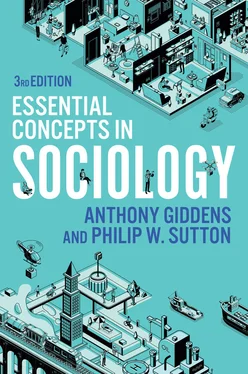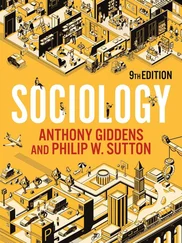Globalization has been theorized as involving several linked processes. Trade and market exchanges routinely take place on a worldwide scale. Growing international political cooperation, as in the notion of an active ‘international community’ or the use of multinational peacekeeping forces, demonstrates political and military coordination beyond national boundaries. Recent developments in information technology and more systematic (and cheaper) transportation also mean that social and cultural activity operates at a global level. In addition, the globalizing of human activity is becoming intensified . That is, there is more global trade, more international politics, more frequent global transport and more routine cultural interchange. The sheer volume of activity at the global level is increasing. And many sociologists perceive a speeding up of globalization since the 1970s with the advent of digitization, information technology and improvements in the transportation of goods, services and people. This rapid globalization has far-reaching consequences, dramatically illustrated by the rapid global spread of the Covid-19 virus in 2020. Economic and political decisions taken in one location can have an enormous impact on other, distant societies, and the nation state, so long the central actor, appears to have lost some of its power and control.
Globalization theorists see the process as fundamentally changing the way people live, but others argue that such claims are exaggerated. Critics (also called ‘sceptics’) argue that, despite increasing contacts and more trade between nation states today than in the past, these have not created a unified global economic system (Hirst et al. 2009). Instead, there has been a trend towards intensified regional trading within the European Union, the Asia-Pacific region and North America. Given that these three regional economies operate relatively independently from each other, the sceptical argument is that any notion of a worldwide, global economic system remains fanciful.
The idea that globalization has undermined the role of the nation state can also be challenged. National governments continue to be key players because they regulate and coordinate economic activity in trade agreements and policies of economic liberalization. Pooling of national sovereignty does not mean its inevitable loss. National governments have retained a good deal of power even though global interdependencies are stronger, but states adopt a more active, outwardlooking stance under the conditions of rapid globalization. Globalization is not a one-way process of ever closer integration but a two-way flow of images, information and influence with diverse outcomes.
Because globalization forms the essential conceptual backdrop to sociology, it is present in an enormous range of recent research studies on diverse subjects, including transnational terrorism, social movementactivity, conflictand war, migration studies, environmental sociology, multiculturalism and many more. As research has progressed, some of the unintended consequences of large-scale globalization have also been discovered. For instance, Renard’s (1999) study of the emergence and growth of ‘fair trade’ products found that, although globalization processes are dominated by large transnational companies, economic globalization also creates smaller gaps, or niches, which small producers can move into and develop based on shared values of fairness and solidarity.
Today the concept of globalization is widely accepted as part of the sociological mainstream and forms the backdrop to research in almost every specialist field of study. Roudometof (2020) argues that the concept is a key element within the contemporary vocabulary of the social sciences and public discourse more generally, which includes cosmopolitanism, hybridity, glocalization, transnationalism and interculturalism. Taken together, this complex of concepts enables sociologists to gain a firmer grasp of the major social and economic changes taking place beyond the level of single nation states. Roudometof sees this as the most important function of the concept of globalization, rather than the various attempts to arrive at an agreed theory of globalization and its positive or negative consequences.
Assessments of globalization differ markedly, but Martell’s (2017) evaluation returns to the familiar theme of inequality. He argues that, although many sociologists see globalization as partly or mainly a cultural phenomenon, we must acknowledge the key role played by capitalisteconomics and material interests. Martell takes issue with cosmopolitan theories of an emerging transnational political sphere, which he sees as overly optimistic. To the extent that it is real, globalization is uneven, reproducing existing inequalities and unequal power chances. Global free movement, for instance, means ‘those least in need – rich elites – being the most free, while those most in need of mobility – the poor and those beyond the rich core – are most restricted’ (Martell 2017: 251). Although cultural change is important, for Martell, capitalist economics remains the crucial driving force that is shaping the modern world.
References and Further Reading
Held, D., McGrew, A., Goldblatt, D., and Perraton, J. (1999) Global Transformations: Politics, Economics and Culture (Cambridge: Polity).
Hirst, P., Thompson, G., and Bromley, S. (2009) Globalization in Question (3rd edn, Cambridge: Polity).
Kilminster, R. (1998) The Sociological Revolution: From the Enlightenment to the Global Age (London: Routledge).
Martell, L. (2017) The Sociology of Globalization (2nd edn, Cambridge: Polity).
Renard, M.-C. (1999) ‘The Interstices of Globalization: The Example of Fair Coffee’, Sociologia Ruralis , 39(4): 484–500.
Robertson, R. (1995) ‘Glocalization: Time–Space and Homogeneity–Heterogeneity’, in M. Featherstone, S. Lash and R. Robertson (eds), Global Modernities (London: Sage), pp. 25–44.
Roudometof, V. (2020) ‘The New Conceptual Vocabulary of the Social Sciences: The “Globalization Debates” in Context’, Globalizations , DOI: 10.1080/14747731.2020.1842107.
Wallerstein, I. (1974, 1980, 1989) The Modern World-System , 3 vols (New York: Academic Press).
Waters, M. (2001) Globalization (2nd edn, London: Routledge).
Modernity
Working Definition
The period from the mid-eighteenth-century European Enlightenment to at least the mid-1980s, characterized by secularization, rationalization, democratization, individualization and the rise of science.
The word ‘modern’ can be used to refer to anything that is contemporary, though the contrast between the ancient and the modern had become more commonplace in Europe by the late sixteenth century (Williams 1987). The idea of modernization – making something more contemporary – was seen as a retrograde step until the nineteenth century, when modernization took on a more positive hue. Over the first three-quarters of the twentieth century, the modernization of transport, houses, social attitudes, fashions and much more was widely seen as necessary and progressive. However, in social theory, ‘modernity’ has a much broader meaning, referring to an entire historical period from the mid-eighteenth century to the 1980s. Enlightenment philosophers attacked tradition, religious authorityand received beliefs, proposing instead that human progress could come only through the application of rational thinking, scientific methods and the pursuit of freedom and equality. Sociology itself is a product of modernity which aims to gather reliable knowledge of the social world through scientific methods in order to intervene and improve societyfor the betterment of all.
Читать дальше












